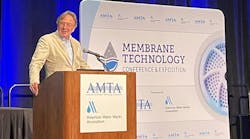By Bruce Koppenhoefer
One of the most crucial issues currently facing plant managers across many industries is that of legacy control system migration. What is it, and why is it such a serious concern?
The term "legacy" was originally used to refer to in-place computers and software to distinguish them from newer systems being brought online. The more contemporary meaning implies systems that have reached, or are approaching, the end of their reasonable lifecycles, often because hardware elements have been made obsolete by the manufacturer (meaning that spares or replacements are unavailable) or because software is no longer being supported with upgrades. By some counts, approximately $65-billion worth of process control systems -- both PLCs and DCSs -- fit this definition.
Challenges Presented by Legacy Systems
Factors that should be considered when determining a migration strategy include the following:
- Discontinued Hardware: When manufacturers discontinue a product, production of that item ends, and the secondary market of used items, such as e-Bay, often provides the only access to replacement hardware. These replacements tend to be expensive, and as supply shrinks, prices increase. Additionally, even with overnight express shipping, a manufacturing facility can lose a day's worth of production tracking down and ordering replacements, which is potentially very expensive.
- Unsupported Software: It is not uncommon for software producers to stop supporting older versions. Take, for example, Microsoft's recent announcement to stop supporting the Windows 7 operating system. When support stops, bugs will not be fixed, new features will not be added and help will be limited or unavailable. This may limit attempts to improve productivity, generate new reports or expand user seats.
- Security: Many legacy systems were installed long before the advent of widespread connectivity and the rise of almost recreational hacking. These systems generally lack basic security features needed to deter hackers, making them vulnerable to data theft and disruption of operation.
What is Migration?
We typically think of migration as meaning complete system replacement. While this is the case more often than not, particularly if the fundamental issue is that of discontinued hardware, migration can also involve upgrades of system sub-units, software replacement or phased (as opposed to wholesale) replacement. The appropriate strategy for a given situation will depend on the details of that particular system.
In the municipal arena, the migration strategy can be particularly challenging because of budget considerations, which are traditionally very tight. Some aspects of a migration plan, such as software upgrades, may fall under a maintenance budget, whereas large-scale hardware replacement may have to be part of a capital budget. In some situations, a phased approach for hardware may be implemented to coincide with major process equipment replacements.
Planning
When developing a migration strategy, it is important to consult with a qualified control systems integrator early in the planning process. He or she can conduct an analysis of current systems and make recommendations about new platforms, phasing of replacements and techniques for keeping the plant fully operational during the migration process. The integrator can also advise on network security issues. Such careful and thoughtful planning will make for a smooth migration project.
About the Author: Bruce Koppenhoefer is communications director for Revere Control Systems. He received his BSEE from Northwestern University, and his business career spans more than 40 years in telecommunications and engineering-construction industries where his roles have included equipment engineering, maintenance engineering, product management, proposal management, and marketing management. He is a member of the Water and Wastewater Equipment Manufacturers Association.
More WaterWorld Current Issue Articles
More WaterWorld Archives Issue Articles


